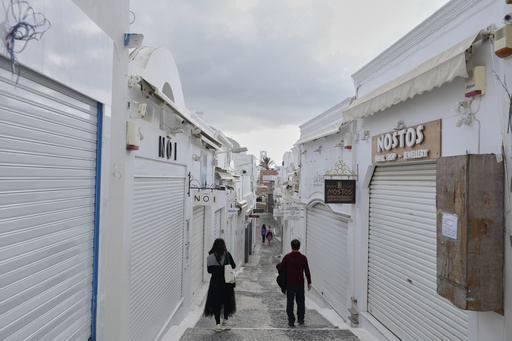
SANTORINI, Greece — On Monday, the volcanic island of Santorini took serious measures in response to an increase in seismic activity that has raised fears of a strong earthquake. Schools were closed and emergency teams were dispatched as a precautionary measure, while several nearby Aegean Sea islands, known for their popularity with tourists, were also put on alert after over 200 undersea tremors were registered in the last 72 hours.
Prime Minister Kyriakos Mitsotakis addressed the situation from Brussels, urging residents to remain calm and heed the advice of Civil Protection authorities. He acknowledged the intense geological activity affecting the region and emphasized the importance of public safety.
Local alerts regarding potential rock slides were triggered on mobile devices across the island, and the sounds of earthquakes reverberated through the air, creating a sense of unease among residents. Authorities have restricted access to certain coastal areas, including Santorini’s old port, as they are close to potentially unstable cliffs.
Civil Protection Minister Vasilis Kikilias reassured the public that the current measures are merely precautionary and urged citizens to follow safety recommendations closely. Despite Greek scientists stating that the small quakes with magnitudes often exceeding 4.5 are not directly connected to Santorini’s volcanic activity, a growing concern remains regarding the ongoing seismic disturbances.
Government officials continued to collaborate with scientists over the weekend and into Monday to better understand the situation. Schools on islands such as Amorgos, Anafi, and Ios have also been ordered closed as a safeguard against any possible hazards.
The persistent quakes, which have occurred every 10 to 20 minutes, have stirred anxiety among both residents and tourists. Michalis Gerontakis, the director of the Santorini Philharmonic Orchestra, voiced the community’s worries, noting the unusual frequency and intensity of the seismic activity. He remarked, “Even during our performance for a religious event, we could feel the tremors but continued to play.”
Authorities have advised against large indoor gatherings and urged people to stay away from areas susceptible to rock falls, prompting hotels to begin draining their swimming pools to mitigate earthquake-related damage.
Emergency responders set up a base of operations by erecting yellow tents in a basketball court adjacent to the main hospital on the island. Fire brigade officials, including Brigadier Ioannis Billias, noted that many residents opted to sleep in their vehicles out of fear. There has been a notable increase in requests for tickets to leave the island, with some, like Nadia Benomar, feeling compelled to escape temporarily due to the unsettling seismic activity.
Conversely, others have chosen to stay despite the ongoing tremors. Restaurant worker Yiannis Fragiadakis returned to Santorini over the weekend, displaying indifference to the quakes. He commented, “The port was packed, reminiscent of the summer rush, but I plan to remain hopeful for the upcoming holiday season.” On the other hand, South Korean tourist Soo Jin Kim recounted her family vacation experience, stating they felt numerous small shakes but were still inclined to stay, albeit with a sense of apprehension.
The crescent-shaped island of Santorini, renowned for its striking views and unique architecture, attracts over 3 million visitors each year. The captivating cliffs that line the island are a result of a massive volcanic eruption that occurred roughly 3,500 years ago, which significantly altered the landscape and had lasting impacts on ancient civilizations in the region.
Despite being an active volcanic site, the last significant eruption took place in 1950. Gerasimos Papadopoulos, a noted Greek seismologist, cautioned that the recent patterns could suggest a more significant seismic event may be on the horizon. He stated, “The increased number of tremors and shifting epicenters are concerning, although these quakes are tectonic in origin.”
In Fira, the island’s main town, local officials have set up gathering points for residents in case an evacuation becomes necessary. Mayor Nikos Zorzos reassured the public that while they are preparing for potential scenarios, these preparations do not guarantee that an event will actually occur, encouraging a measured response to the unfolding situation.

